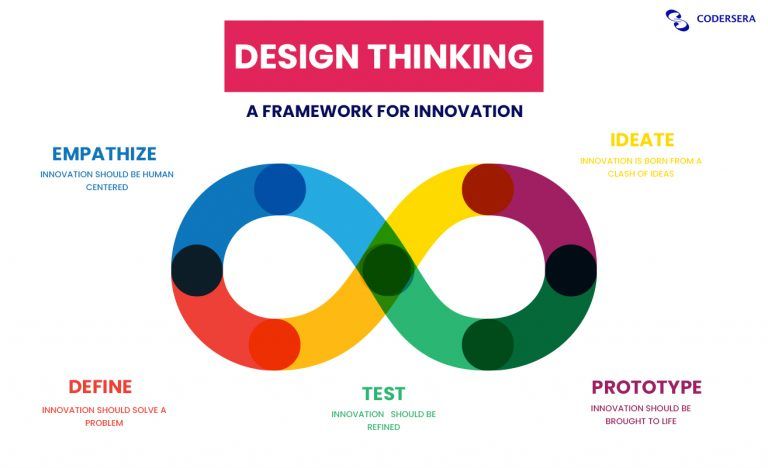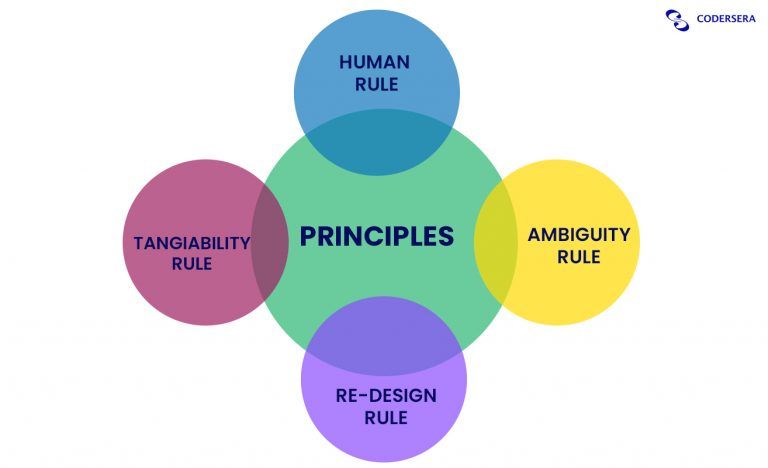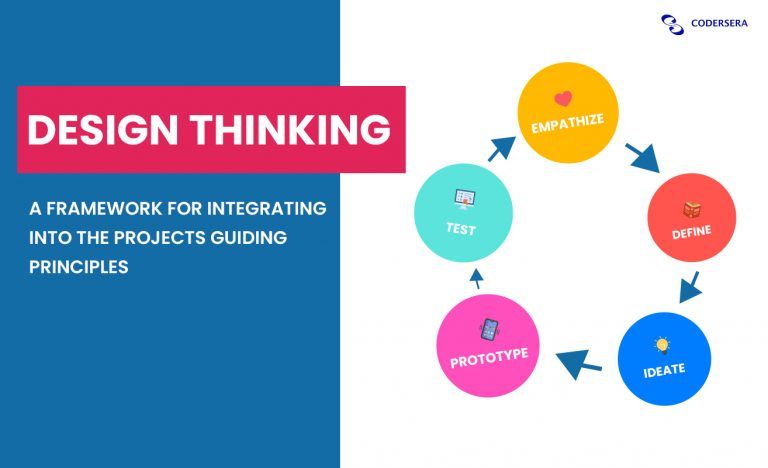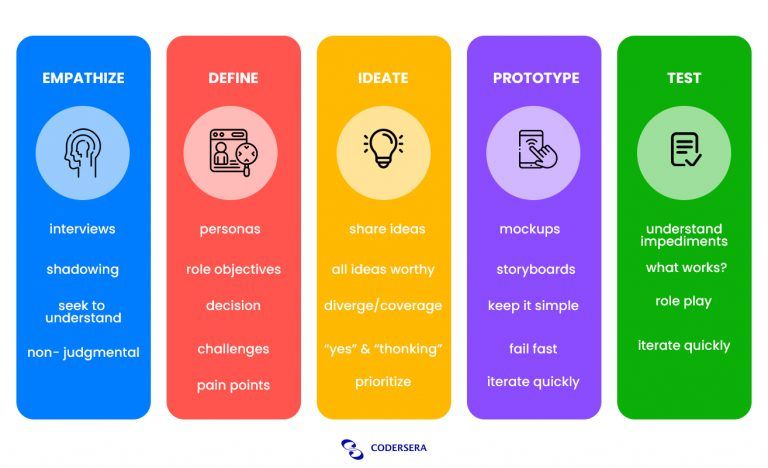Design Thinking- Way Of Creating New Concepts

Want to create something new or want to invent some new ideas or concepts? Design thinking is really important for creating something new, as well as it is important for the company to hire some creative people for their projects. Design Thinking is the process of introducing some new concepts to the market.
Every company’s first need is always something new, it would be a new idea or new concept of programs. It helps to gather new and innovative techniques to explore the technology in various ways as well as in different marketing according to the users.

Tim Brown, CEO of IDEO, a design firm that popularizes the term design thinking, said: “Design thinking can be described as a discipline that uses the sensibility and approach of designers to meet the needs of what is technically possible and what is technically possible.
Strategy can be translated into customer value and market opportunities. Research, shape, generate ideas and generate solutions, creative thinking, sketching and drawing, modeling and prototyping, testing and evaluation.
Thinking is a non- Linear iterative cycle involving a deep understanding of customer needs or user grievances in context Targeting a specific situation, analyzing data and looking for ideas, questioning assumptions, exploring different perspectives, re-transforming problems into possibilities, generating creative ideas, critiquing and selecting ideas, test them with prototypes and experiments, improve solutions, and ultimately realize their innovations.
What is Design Thinking
It is creative thinking which helps to build or launch a new product or some strategies to invest in some new concepts.
Is it necessary to have design thinking abilities to boost the market? Well!! Yes, it is,
even is much more important to have the abilities that think so creatively and bring new ideas to the market according to the users as well as market needs.

Used in the right way, Design Thinking can help you understand the mindset and needs of the people you are creating products for, identify opportunities based on those needs, and guide you to innovative new solutions, starting with quick, low-fidelity experiments that provide learning and Improve efficiency, gradually become loyal.
Thinking like a designer can change the way organizations design products, services, processes, and strategies. The idea of design thinking states that in order to find innovative solutions, you must adopt a design mentality and look at problems from the perspective of the user.
Design thinking also helps to boost your business, let’s see how it is beneficial principles for the business:
- The business of the company only increases when there is a designer who thinks about all the points from start to end as well as the designer put users first in mind, which is the first duty of the company is to think about the users than the success.
- With the first point, the designer understands the problems of the users, not the static and it boosts the people's interest in your company which attracts more and more users and enhances your business.
- The designer goes to the depth of the problem, it may be like they get their hands in the dirt, which simply means that with the complicated techniques and results, the designer makes it easy for the users.
To boost your business and other further details, have a look at the much more exciting blogs and also apply here as per your company requirements.
Designer thinking is best for users as well as to boost your business. In today’s world, design thinking is very important because it is the trend where everyone wants something new and innovative. And it is only possible for the designer to think outside of the box.
5 Phases of Design Thinking

Here we describe the design thinking in 5 stages:
Empathize
Research users’ need is the main motive of this stage. This is the stage to find out what actually the users need in the program or what kind of features they want in the application.
Thinking like a designer means asking a lot of questions and seeing things from the client’s point of view. To be truly human-centered, designers look at how people use a product or service and continue to improve the product or service to improve the consumer experience.
It is a user-centric process that starts with user data, creates design artifacts that meet the needs of real and non-imaginary users and then tests those artifacts with real users.
It is based on an empathetic observation of how people interact with their environment and uses an interactive and hands-on approach to create innovative solutions. It focuses on generating ideas with specific problems, always putting the user at the center of the process.
It is useful for solving poorly defined or unknown complex problems, understanding the human needs involved, reformulating problems in a human-centric way, brainstorming large numbers of ideas, and taking a hands-on approach to prototyping and testing.
A user-centered, hands-on problem-solving approach leads to innovation, and innovation leads to differentiation and competitive advantage.
Define
The second stage of design thinking and this stage state the user’s needs as well as their problems. It is important to make your users fully satisfied with your applications and it is easy to operate for that it’s really important to think like the user before launching in the market.
The design team demonstrates all the possibilities of the application and develops programs according to the needs of users, and always creates something new that attracts users to the company.
It seems obvious: that the product you’re building is for the people who will use it. But as many have discovered, without a solid process behind your work, it’s very easy to replace the user’s point of view with your own, develop a narrow vision, and think about business goals rather than user needs.
Ideate
After the above stage, this is the third most important stage of design thinking which states the assumption as well as creates new ideas. Here, all the possibilities of the application and its working as well as the output are all taken care of as to how it is beneficial for the users.
Designers will conduct idea-generation sessions to find as many new points of view and ideas as possible.
There are many different ideas that designers can use, from brainstorming and mind mapping to bodystorming (role-playing scenarios) and provocation, a highly non-standard thinking technique that forces a designer to challenge established beliefs and explore new options and alternatives.
It is creative thinking that helps to create or launch a new product or some strategies for investing in new concepts.
Prototype
After the third stage, let's come to the fourth most important stage of design thinking, here we see how many solutions can an application have, which simply means this stage tells you about creating solutions for the application. Prototype sees the need as well as ideas of the application before creating solutions.
The way of prototyping new concepts:
The design team proves all the possibilities of the application and creates prototypes of the programs according to the user’s needs as well as create always something new that attracts the users toward the company.
Design thinking is so innovative and difficult as well at the same time because it takes time to create some new idea that is useful to the users and to hold the market.
You can think of it as a technique that is used to attract users and increase the market of the company.
Test
It’s like mission complete!!, the last but as well as important stage of design thinking. It’s the time when the application you invent checks its all outcome or solutions as well as proves it for a user to use the application.
We hope, that now you must have gained a decent amount of knowledge about how design thinking works.
What is special about how designers think?
Design Thinking is taught in top business schools. It is an approach to operations, products, and innovation that has taken root far beyond the design world.
- Designers think about people: their brains are trained to put aside natural biases and limitations, numbers and profit margins, and think first and foremost about what’s best for the end user.
- Designers understand that problems are not static: they can be approached from multiple perspectives so that both the problem and the solutions evolve together, making it easier to act quickly and effectively.
- Designers get busy and get their hands dirty: they don’t wait until they have a fully formed plan in place to start building a new website, product, or building. Designers solve complex problems with an emphasis on solutions.
- The fundamental component of design thinking is the idea: the phase in which the action of creating original solutions takes place. Here are six ways that business teams can come up with design thinking.

Bestselling author Seth Godin introduced the purple cow idea. One day he was driving through the countryside with his family. They saw cows grazing and thought it was a beautiful sight. But as they continued to move, they saw one cow after another, and the cows became normal: they lost their novelty.
It was then that Godin thought, “What if there is a purple cow?” The purple cow would get their attention again because that would be wonderful.
Purple cows are ideas that combine two or more concepts that were not previously related to each other to create something extraordinary.
For example, vacant rooms and skyrocketing hotel prices were never tied together until Airbnb came along. Airbnb is now at the forefront of the sharing economy. Connecting the dots to create a purple cow idea, something innovative and extraordinary, requires thinking outside the box.
Start by identifying specific resource categories available for your business, what your business wants to achieve, and/or sources of inspiration for your business. Categories your team may find useful are Current Products, Target Audience, and Companies We Admire.
- Start with at least three categories, but no more than six.
- Set a time limit and fill the cards with items that fall into each category. Divide your cards into appropriate categories. Start looking for original connections.
- Turn over cards from each pile to create random combinations. Mix the stacks and lay them out on the table.
- Ask your team to stand around the table and point out possible connections. Write down any suggestions – do not filter suggestions.
Warning: Brainstorming is not an effective way to generate original ideas in a group. Brainstorming — the unfiltered method of sketching ideas we all learn in elementary school — can only be done on an individual basis.
The researchers found that group brainstorming did not produce the most original or best ideas. Instead, it leads to groupthink.
Some Platforms for Designers
Google is known for formalizing the idea of play at work with its “20% of the time” policy, which asks employees to use 20% of their time to focus on whatever problem or idea they like. direction or supervision.
Of course, “20% of the time” was viewed more as philosophy than as real politics, but the idea still has its merits. When team members are given time throughout the day to focus on issues they find interesting, regardless of outcomes or specific business drivers, the company’s overall creativity and morale improve.
And in the case of Google, foundational products like Gmail and Adsense are being created. Pablo Picasso said: “Good artists borrow, great artists steal.” Now we don’t recommend stealing, but it’s always good to see what others have done before you for inspiration.
Indeed, it is sometimes helpful to start by examining and trying to mimic an existing solution. For example, if you want to create an application like Slack, start by looking at what Slack does, how it works, and why it is effective.
Use what you’ve learned to start creating your own solution, which will inevitably grow into his style, his purple cow, as you delve deeper into the creative process.
- Dribbble: This is the website where top designers showcase their latest designs. It’s full of illustrations, websites, layouts, and more.
- Behance: Another great site to check out relevant and quality designs. Sift through specific categories like decoration, photography, or industrial design.
- Muzli: A tab extension for Chrome. Whenever you open a new tab, Muzli will populate that tab with carefully curated news, inventions, and design images from around the web that you can customize to your liking and needs.
In A Nutshell…
Design Thinking is fundamentally a design-specific issue-solving strategy that entails examining known parts of a problem and discovering the more ambiguous or peripheral factors that contribute to the problem’s conditions.
This is in contrast to a more scientific method, which involves testing specific and well-known factors in order to arrive at a solution.
Design Thinking is an iterative process in which knowledge is continuously challenged and obtained in order to help us redefine an issue in order to uncover alternative tactics and answers that may not be obvious at first.
Designers, like artists, are seeking to establish new ways of thinking that do not comply with the prevailing or more frequent problem-solving methods, which is why Design Thinking is sometimes referred to as “outside-the-box thinking.”
The objective behind Design Thinking is to enhance products by examining how consumers engage with them and investigating the environments in which they operate. Design Thinking allows us to delve a little further to find methods to improve user experiences.
Like the article? Codersera will be your one-stop shop for all the informative and trending content needs.
FAQ's
Which mode of Design Thinking creates new concepts and ideas?
Ideating: Creating many ideas in ideation sessions. Prototyping: Adopting a hands-on approach in prototyping.
What are the 3 key concepts of Design Thinking?
The next time you need to solve a problem, you can grow your team's creative capacity by focusing on three core design thinking principles, or the 3 E's: empathy, expansive thinking, and experimentation.
Is design thinking a new concept?
Design Thinking is a large part of that new approach toward innovation, as it allows people, teams, and organizations to have a human-centered perspective, and yet a scientific approach, toward solving a problem.
What is generating design ideas?
Generating ideas is like finding paths for users to travel from a complex state to a delightful one. There shall always be more than one way to solve a problem.